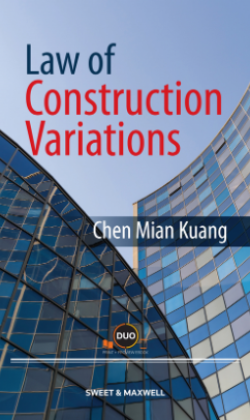
GET UP TO 15% DISCOUNT!
Sign up now as a CBS member & enjoy our royal discounts!

Law of Construction Variations
- Publication Date : Mar - 2025
- Author : Chen Mian Kuang
- ISBN : 9786297700434
- Format : Hardcover + eBook
- Country : Malaysia
In a construction project, it is not always possible to cover every aspect and detail of the works required in the contract documents. Therefore, some aspects of the specifications are implied and/or inferred to be within the contract as long as they are reasonable and necessarily intended, and not contradictory to the express terms of the contract. This can result in a dispute between the contracting parties, as the implied specifications and works may not have been considered and priced by the contractor, leading to a claim for variation order subsequently.
This book focuses on issues arising from the variation of construction works. Following the determination of the original work scope, express and implied, consideration is given to the power to vary works followed by a review of the procedure for and the valuation of variations. The book also analyses the possibility of recovering payment for extra work done on the basis of restitution – in the form of quantum meruit and under the Contracts Act 1950. The impact of variations on time obligation is given close examination through chapters discussing the prevention principle, extension of time, liquidated damages, and loss and expense incurred by the contractor.
The analytical discussion provided cites local judicial decisions and those from other Commonwealth jurisdictions such as Singapore, Australia and the United Kingdom. Selected clauses of popular standard form contracts are surveyed and insightful comments provided on grey areas in the law. This book is one not to be missed by architects, quantity surveyors, claims consultants, construction lawyers, developers, contractors, arbitrators, lecturers and students of construction law.
Key Features
- Provides focused consideration of the law relating to variation of construction contracts.
- Valuable resource on an important area of construction law with a dearth of materials covering it specifically.
- Reference made to authorities from Malaysia, Singapore, the UK and Australia.
- Carefully structured to introduce the nature of variations, the relevant procedure to apply for it, the valuation of variations and the impact of variations on time obligations.
- Clear discussion of the applicable procedural requirements.
- Written by author with some 25 years’ experience in construction advisory, litigation and arbitration.
Table of Contents
- Introduction
- Express Original Work Scope
- Implied Original Work Scope
- Power to Vary the Works
- Contract Procedure for Variations
- Valuation of Variations
- Quantum Meruit and Section 71 of the Contracts Act 1950
- Time – General Principles
- Time – Substantive Issues
- Time – Procedural Issues
- Time – Liquidated Damages and Section 75 of the Contracts Act 1950
- Time – Prevention, Notification Requirements and Extension of Time
- Time – Loss and Expense
Law of Construction Variations
In a construction project, it is not always possible to cover every aspect and detail of the works required in the contract documents. Therefore, some aspects of the specifications are implied and/or inferred to be within the contract as long as they are reasonable and necessarily intended, and not contradictory to the express terms of the contract. This can result in a dispute between the contracting parties, as the implied specifications and works may not have been considered and priced by the contractor, leading to a claim for variation order subsequently.
This book focuses on issues arising from the variation of construction works. Following the determination of the original work scope, express and implied, consideration is given to the power to vary works followed by a review of the procedure for and the valuation of variations. The book also analyses the possibility of recovering payment for extra work done on the basis of restitution – in the form of quantum meruit and under the Contracts Act 1950. The impact of variations on time obligation is given close examination through chapters discussing the prevention principle, extension of time, liquidated damages, and loss and expense incurred by the contractor.
The analytical discussion provided cites local judicial decisions and those from other Commonwealth jurisdictions such as Singapore, Australia and the United Kingdom. Selected clauses of popular standard form contracts are surveyed and insightful comments provided on grey areas in the law. This book is one not to be missed by architects, quantity surveyors, claims consultants, construction lawyers, developers, contractors, arbitrators, lecturers and students of construction law.
Key Features
- Provides focused consideration of the law relating to variation of construction contracts.
- Valuable resource on an important area of construction law with a dearth of materials covering it specifically.
- Reference made to authorities from Malaysia, Singapore, the UK and Australia.
- Carefully structured to introduce the nature of variations, the relevant procedure to apply for it, the valuation of variations and the impact of variations on time obligations.
- Clear discussion of the applicable procedural requirements.
- Written by author with some 25 years’ experience in construction advisory, litigation and arbitration.
Table of Contents
- Introduction
- Express Original Work Scope
- Implied Original Work Scope
- Power to Vary the Works
- Contract Procedure for Variations
- Valuation of Variations
- Quantum Meruit and Section 71 of the Contracts Act 1950
- Time – General Principles
- Time – Substantive Issues
- Time – Procedural Issues
- Time – Liquidated Damages and Section 75 of the Contracts Act 1950
- Time – Prevention, Notification Requirements and Extension of Time
- Time – Loss and Expense
GET UP TO 15% DISCOUNT!
Sign up now as a CBS member & enjoy our royal discounts!

